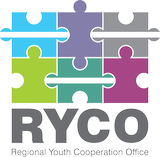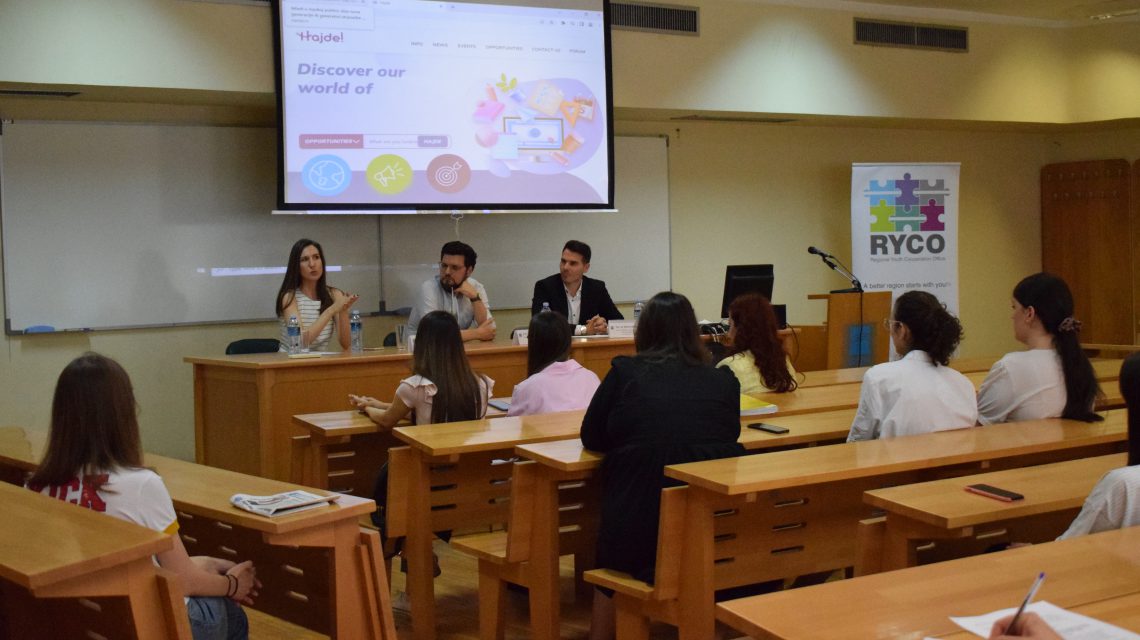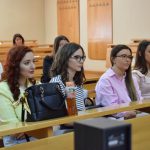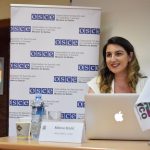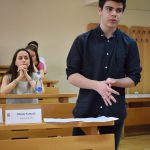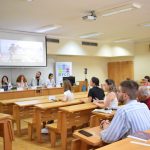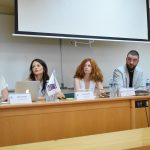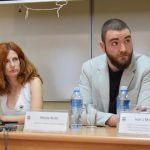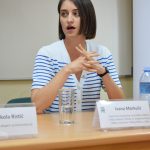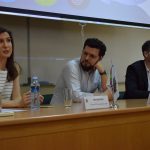BELGRADE- On the 15th of June 2022 at the premises of the Faculty of Political Sciences in Belgrade LBO Serbia had organized two successful events presentation of the Hajde club and awarding ceremony for young journalists and “Meet up: Young people and the peacebuilding in the region: They are awoken?“ .
During the first event the newly formed Hajde club was presented together with the results of the third cycle or RYCO program for young journalists which was realized in cooperation with the Faculty of Political Sciences (FPS) in Belgrade from October to December 2021.
The event was opened by the Vice Dean of FPS, Prof. Dr Nemanja Džuverović, Ms Marija Bulat, Head of LBO in Serbia and doc. Dr Marko Nedeljković, mentor to the team of journalists from FPS. They all agreed that the Hajde platform is an amazing opportunity for journalism students from the Western Balkans and that this project is just the beginning of cooperation between RYCO and the Faculty of Political Sciences. On that occasion Nevena Jovanović, Maja Milošević, Jovana Stanković i Aleksandra Ničić were awarded with the certificates of appreciation and they shared their impressions about the program and informed us more about the articles they created.
Joining the Hajde club allows journalism students the opportunity to create media content and publish articles on the regional platform Hajde, but also to cooperate with colleagues from the region as Hajde club will be formed at other faculties who were partners during the project implementation and that educate future journalists and media professionals from the Western Balkans.
Second event was a panel discussion – “Meet up: Young people and the peacebuilding in the region: They are awoken?“ which RYCO organised together with the OSCE mission to Serbia and the Faculty of Political Sciences and which was also streamed on Zoom.
Participants in the discussion were Ms Mia Bjelogrlić, author of the TV series “She is awaken”, doc. Dr Biljana Đorđević from the Faculty of Political Sciences, Ms Ivana Markulić from the Regional Youth Cooperation Office in Serbia and alumnae of the ”Follow us: Dialogues Academy for young women” program organised by the OSCE Mission in Kosovo and the OSCE Mission to Serbia, Mr Nikola Vučić, TV producer, editor and author publications “Critique of Toxic Masculinity” and Mr Nikola Ristić, activist and expert on communication. The moderator of the panel discussion was Ms Milena Stošić from the OSCE Mission to Serbia.
The panel discussion was opened by members of the FPN Debate Club: Ms Katarina Lazić, Mr Pavle Antonijević, Ms Ana Marković, Mr Nikola Pantelić and Ms Andrijana Ristić, debating on the introductory topic “this house believes gender equality is essential for regional peacebuilding“ simulating the roles of the Government and the opposition, they presented arguments for and against.
Mr Vučić was the first one to present, explaining the concept of toxic masculinity. He pointed out that toxic masculinity is not a biological category, but a sociological construct. Afterwards Ms Markulić explained that peacebuilding is precisely where we have a community structure that is good in its composition and destroys the causes of future violence and conflicts. “We are working together to create a society in which there will be no hate speech” said Markulić.
Doc. Dr Biljana Đorđević pointed out the problem of patriarchy in rural areas, because of which women in such environments often find condemnation. According to her, urban and rural areas differ significantly, in rural areas communities held tighter together.
Mr Ristić said that we are not talking about the problem of gender equality in social media. He afterwards explained that raising visibility on the topic of gender equality is bringing us a step closer towards solving it. Ms Bjelogrlić commented on the importance of her project “She is awaken” and how much did the topic of sexual harassment of women helped raise awarness about some other important social topics – which were not talked about much in the media before. “It is nationalism that stops any kind of gender progress and gender emancipation ” she concluded.


